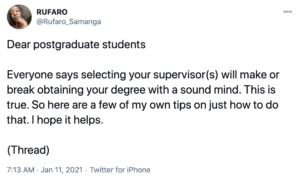
If you’ve ever wondered how to go about selecting a supervisor for post-graduate studies, this advice will get you started.
1. Know what you need from the get-go. As people, and as students, we need different things to succeed. Ensure you know what this is for you and make your search and eventual selection of a supervisor based on that.
2. How do you know which academic does what? Either email a number of potential academics or organise a quick in-person/online meeting with them to discuss their respective research interests. You can either align yourself to these or ask if they’re willing to take you on but supervise a topic outside of their own research interests. It’s not unheard of but just depends on them.
3. Ask them about their supervision style, what works for them and assess whether that sounds like it would work for you. You can love their research topics but if you feel like they won’t be a good enough supervisor, find someone else. Remember you’re going to be spending anything from 1 to 4 years with this academic. Be deliberate and steadfast on what you want. If you sense a weird vibe, trust your gut. Please.
4. Find out who else they have supervised. You want to make sure that whatever the academic describes is actually true. You can ask them to refer you to some of their current or previous students or ask them to link you to their students’ work so you can find them yourself.
5. If you’re already at the institution you’re planning on doing the postgraduate degree, NEVER assume that just because an academic is a great lecturer, that they’ll be a great supervisor. I made this mistake and I’m still paying for it. Do the digging, don’t assume.
6. You ideally want to have one supervisor. I have three, and it’s harrowing! Sometimes you’ll have a co-supervisor/advisor to help with an area of the research so make sure you know about how they work and supervise too. Ultimately, your primary supervisor is in charge.
7. Very often students feel like supervisors are doing them a favour. Not so. You’re giving them a potential publication from your work so they benefit too. Make sure you communicate what your expectations are of the relationship from the get-go and see how they respond.

